
Riot Round-Up: The Best Books We Read In December
We asked our contributors to share the best book they read this month. We’ve got fiction, nonfiction, YA, and much, much more- there are book recommendations for everyone here! Some are old, some are new, and some aren’t even out yet. Enjoy and tell us about the highlight of your reading month in the comments.
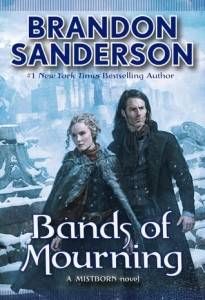 The Bands of Mourning by Brandon Sanderson (Jan. 2016, Tor Books)
The Bands of Mourning by Brandon Sanderson (Jan. 2016, Tor Books)
Coming out later next month, Bands of Mourning by Sanderson continues the adventures of Wax and Wayne, magical, metallic gunslingers in a city fueling the heart of an industrial revolution. Wax, coming to terms with the revelations of the previous book, Shadows of Self, tries his hardest not to get sucked back into a world of mysteries, danger, and the unknown. But when a chance to find a relic from over three hundred years ago, a relic with seemingly infinite potential to change the modern world, Wax not only finds himself dragged back into the fight, but will have to stand his ground before a world ready to snuff him out, and answer the question of what makes him tick, and what exactly does he fight for. Sanderson knows how to put together a great tale, and while the first two books with Wax and Wayne were strong and fun, I feel that he really hit his stride with this one. Humor, action, intrigue, and an increasingly diverse cast of flawed, solid characters make this book shine, and that’s even before I geek out over the tantalizing tidbits Sanderson drops about the universe he writes in. With all of his novels in an interconnected universe, Sanderson is starting to show some of his cards, and it makes for compelling reading. It’s hard to say much without giving a lot away, but trust that Sanderson spins a yarn with a deft hand, great humor, and will have Sanderfans positively brimming with excitement at the potential stories to come in the Cosmere. — Martin Cahill
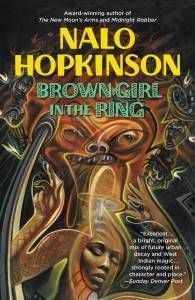 Brown Girl In the Ring by Nalo Hopkinson
Brown Girl In the Ring by Nalo Hopkinson
After reading Falling In Love with Hominids, I was determined to go back and read every book Hopkinson has ever written. Brown Girl In the Ring is her first novel, and it’s a powerful beginning to a body of work. It takes place in dystopian Toronto, but it is just as much about the complicated relationships the women in this family have with each other as it is about organ farms. That’s not even mentioning the pantheon of gods that keep trying to force themselves into Ti-Jeanne’s life, while she has enough on her plate just trying to take care of her baby and avoid her charming but dangerous ex-boyfriend. This novel teems with life and seems to expand beyond its pages. I can’t wait to binge-read the rest of Hopkinson’s back list. — Danika Ellis
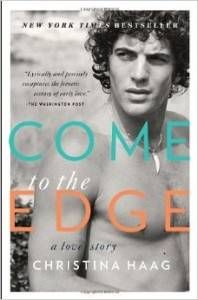 Come to the Edge: A Love Story by Christina Haag
Come to the Edge: A Love Story by Christina Haag
Sleepily browsing my Audible library on the plane home for Christmas, I clicked on one of my very favourites – the author’s tender memoir of her time with John Kennedy Jr, growing up in one another’s orbit in NYC, sharing a house at Brown, and then finally being a couple and losing each other. It’s been a long time since I’ve read it, and it’s every bit as good as I remember. The audio is wonderful – Christina Haag reads it with emotion but without ever overdoing it. This book is romantic and heartbreaking and so evocative, with a wonderful sense of place and beautifully crafted writing. It’s perfect for reading by the fire or listening to while dozing off jet lag – in other words, holidays are a great time to read or re-read this one. — Claire Handscombe
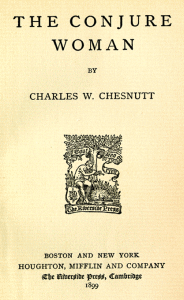 The Conjure Woman by Charles Waddell Chesnutt
The Conjure Woman by Charles Waddell Chesnutt
This is probably my favorite “forgotten” classic of the year. It’s a collection of antebellum slave folk tales first published in 1899. The writing style is super clever and smart–Chesnutt definitely had a way with words–and the stories in the book offer a completely unromanticized portrait of a world terrible and strange, where anything can happen. That might make it seem far removed from the modern era, but the way Chesnutt frames the folk tales allows him to comment on contemporary (for his own time, at least) race relations in the South, and to show how they’re informed by the past. I listened to the Librivox audiobook production of The Conjure Woman and the reader, James K. White, was absolutely pitch perfect. Definitely recommend this one! — Tasha Brandstatter
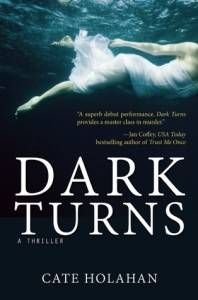 Dark Turns by Cate Holahan
Dark Turns by Cate Holahan
Ballet. An academic setting (a boarding school, to be precise!). A PoC main character. And a murder mystery. This novel rang so many of my bells, it’s not surprising that I loved it. Holahan writes the main character, Nia Washington, so well. A talented ballerina taking a year off because of injury, Nia is smart, capable, and entirely engaging. The book has a dark, sinister atmosphere that will suck you in completely, and you won’t be sure who you can trust as the story races through twists and turns. It’s one I thoroughly enjoyed from beginning to end, and will be recommending to everyone I know. — Swapna Krishna
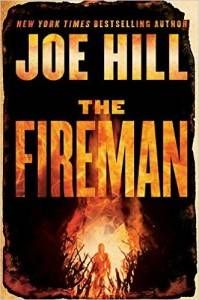 The Fireman by Joe Hill (May 2016, William Morrow)
The Fireman by Joe Hill (May 2016, William Morrow)
Joe Hill fans, rejoice! In the not-so-distant future, a deadly disease called Dragonscale is infecting people all around the world. No one knows what causes it, but its symptoms start out as a scaly rash and progress to spontaneous combustion. So far, no one has found a cure, and the world in becoming a place of chaos and panic as more and more fires burn across the lands. Infected nurse Harper Grayson must fight for her life and the life of her unborn child as the country begins to round up those with the ‘scale. Helping her hide away from the self-appointed extermination gangs is a mysterious stranger called The Fireman, an infected man dressed in fire gear, who seems to have the ability to control the disease, and can even use it to cause fires at will. The Fireman is the most thrilling, imaginative story Hill has written yet. — Liberty Hardy
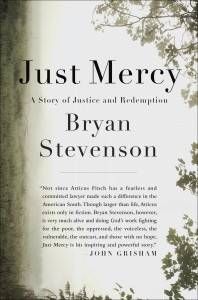 Just Mercy: A Story of Justice and Redemption by Bryan Stevenson
Just Mercy: A Story of Justice and Redemption by Bryan Stevenson
This is a book to read slowly and thoughtfully. Mr. Stevenson tells stories from his experiences as a lawyer for the most marginalized in our communities: the wrongly condemned, children on death row, and Americans in the most desperate of situations. Through his eyes we see the tragedies of our criminal justice system and how one person can make a difference. If you loved Atticus Finch from To Kill a Mockingbird, you’ll find the real deal in Bryan Stevenson. — Karina Glaser
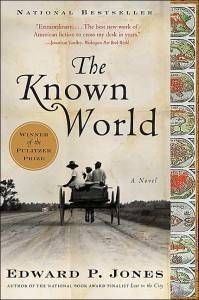 The Known World by Edward P. Jones
The Known World by Edward P. Jones
This was the final assigned reading for my Introduction to Fiction class and it was SO GOOD. The omniscient third-person narrator takes some adjustment, but once you get into the voice, the book is grand. So many incredible characters populate Jones’ fictitious Virginia county and the discussion I’ve had on this book in class has been incredible. When considering the “Great American Novel,” The Known World should absolutely be part of that discussion. — Chris Arnone
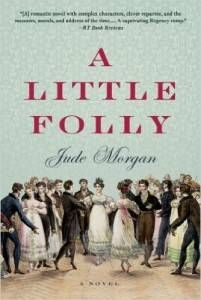 A Little Folly by Jude Morgan
A Little Folly by Jude Morgan
There are really very few Austen pastiches that I find worthwhile in the end. Very few authors can really hit the combination of tone, wit, penetrating observation and deep understanding that makes Austen’s work so compelling (and some don’t seem to even try- I think I’m full up on “Austen with sexy bits” takes for awhile, thanks). But Morgan is one of the very few I’ve seen that gets really close to the authorial voice and intelligence that I look for in Austen, combining it with the added spirit of fun and frivolity that made the best of her imitators, Georgette Heyer, so beloved. The characters are a remix of Austen archetypes, recombining characters to great effect. This story focuses on a brother and sister who grew up in the shadow of a crushing, tyrannical father- and what happens when they are finally given the freedom to choose and the freedom to encounter the world. As you might expect, problems follow, some light-hearted, and some treated with the great moral deliberation we expect from Austen. While there are some pacing issues, among other minor flaws, Morgan’s success in reproducing the tone of Austen’s novels, drawing memorable character portraits and bringing some of the insight that many of us hoped to find in this novel in the first place makes this more than worth the reading and then some. — Kelly Anderson
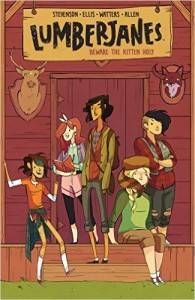 Lumberjanes 1 & 2 by Stevenson, Ellis, Watters, and Allen
Lumberjanes 1 & 2 by Stevenson, Ellis, Watters, and Allen
I wish I had a tween daughter so that I could catch her reading this under the covers. This comic adventure about five best friends– who happen to have a non-didactic representation of body types, skin tones, and sexualities– is weird, fun, silly, and beautifully drawn. Oh, and there are gazillions of puns. I’m told by librarians that this is circulating faster than anything in a long time, so keep up with the kids and grab a copy. Then, once you’re as hooked as I am, preorder Volume III! — Julia Pistell
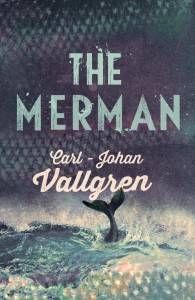 The Merman by Carl-Johan Vallgren, translated by Ellen Flynn
The Merman by Carl-Johan Vallgren, translated by Ellen Flynn
Nella is 15. Her father is in jail, her mother is an alcoholic, and her and her brother are victims of brutal and violent bullying at school. As she’s trying to pay off her harassers and keep her and her brother fed, she discovers that her best friend’s brothers, local fishermen, caught something bizarre and otherworldly on their last fishing trip, brought it home, and have locked it in an abandoned shed. Nella feels companionship for the creature and is the only human it encounters who exhibits compassion toward it. This is a book about both the best and the worst of humanity. It’s bleak, strange, and harrowing: a perfect read for the dark days of winter. — Amanda Nelson
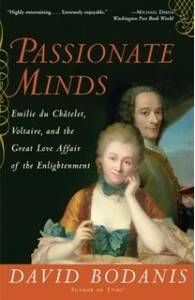 Passionate Minds: Emilie du Chatelet, Voltaire, and the Great Love Affair of the Enlightenment by David Bodanis
Passionate Minds: Emilie du Chatelet, Voltaire, and the Great Love Affair of the Enlightenment by David Bodanis
You probably know who Voltaire is, but does the name Emilie du Chatelet ring a bell? The eighteenth-century aristocrat learned astronomy from her father’s friends as a child, taught herself calculus as a teenager, took up fencing and, when her parents insisted she marry, challenged one of her suitors to a duel (she won); after securing herself a wealthy, friendly, and perennially absent husband, she had a wild affair with Voltaire, threw him over when he got too whiny, took up with the handsome astronomer son of a pirate, threw HIM over when he failed to suitably adore her, deigned to consort once more with Voltaire, and laid the mathematical groundwork for the squared in E=MC2. And that’s just the first four chapters. Passionate Minds is a compulsively readable biography of a criminally overlooked genius whose work translating Newton’s equations into calculus is one of the building blocks of modern science and whose groundbreaking relationship with Voltaire opened the door for modern ideas of love. — Sarah McCarry
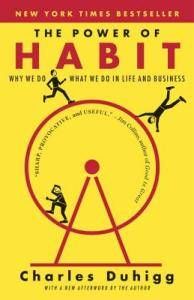 The Power of Habit: Why We Do What We Do in Life and Business by Charles Duhigg
The Power of Habit: Why We Do What We Do in Life and Business by Charles Duhigg
I’ve been on a total non-fiction tear lately, and even though this sounds like a faux-spirational rah-rah type book, it’s actually full of brain stuff. I love brain stuff. I will read any book about brain stuff. This book details how habits form in the brain, how they can be overridden (or not), and how to use habits to make powerful life changes; the examples are fascinating, everything from amnesia patients to multi-national corporations and how habits affected them. — Susie Rodarme
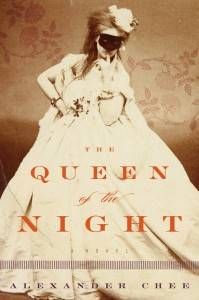 Queen of the Night by Alexander Chee
Queen of the Night by Alexander Chee
I’ve loved opera since I was a teenager, and most of the time I soak it in and drink it up by myself. But it’s okay, because Alexander Chee is here with the most operatic novel I’ve ever read about (wait for it) an *opera* singer whose secret past is the story of a new *opera.* Honestly, even if you aren’t much of an opera aficionado, if you like books with twisty plots, loads of intrigue, unexpected betrayals, and gorgeous dresses, you’ll enjoy the hell out of it. It’s kind of like The Count of Monte Cristo with more ladies. — Jessica Woodbury
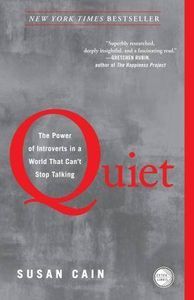 Quiet: The Power of Introverts in a World That Can’t Stop Talking by Susan Cain
Quiet: The Power of Introverts in a World That Can’t Stop Talking by Susan Cain
This is the first audiobook I have listened to in a long time and it was, in a word, amazing. First of all, as far as the audio format goes, they couldn’t have chosen a better narrator. Kathe Mazur’s voice fits the tone of the book perfectly–quiet and measured, yet firm. I basically just want to listen to every audiobook she’s ever narrated. Back to Quiet –I think Susan Cain did a stellar job of exploring the introverted personality type. She sites a number of studies and scientific theories to support her thesis that introversion is an undervalued trait in modern American society. Introverts have just as much to offer the world as extroverts and their unique strengths must be utilized for a society to be truly healthy. Five stars. — Kate Scott
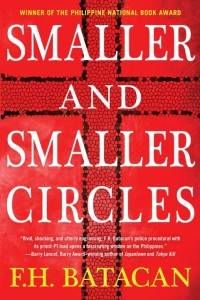 Smaller and Smaller Circles by F.H. Batacan
Smaller and Smaller Circles by F.H. Batacan
The thing about voraciously reading mystery/crime/suspense is that while you still enjoy the books, you inevitably hit a wall where you’re rarely surprised and you can easily guess all the tropes to come. So color me happily surprised to start reading Smaller and Smaller Circles to discover two Jesuit priests (a forensic anthropologist and psychologist) are asked to consult in order to help identify and stop a serial killer—definitely one I’ve never read before. This book was dark, smart, took me to the Philippines, had a fantastic relationship between two priests, AND being set in an impoverished community not only are the priests dealing with corruption but there aren’t labs and machines and technologies that quickly take the evidence and point to a suspect. If you’re a fan of mystery/crime/suspense and regularly find yourself watching true crime/Dateline you won’t want to miss this book. — Jamie Canaves
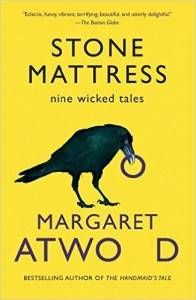 Stone Mattress by Margaret Atwood
Stone Mattress by Margaret Atwood
I had originally planned to save this collection of dark tales for a less festive time of year. But when the weather turned gloomy, warm and downright eerie, I decided to lean in — and boy am I glad I did. It’s hard to know what more a lowly sort like me can say about no less than Margaret Atwood, but I’ll give it my best shot. Stone Mattress is fantastic: bracing, sharp, unsparing, and wryly hilarious. I wasn’t so much “absorbed” by these stories as yanked in by a fishhook. Stone Mattress offers everything from a Black Widow murderess to a freeze-dried groom to the return of three (or four) old favourites from The Robber Bride. This book had me alternately spitting in contempt and cackling like a harridan. Highly recommend for basically everyone, but especially anyone who’s ever been derisively called “angry feminist,” “misandrist,” or “harpy.” — Maddie Rodriguez
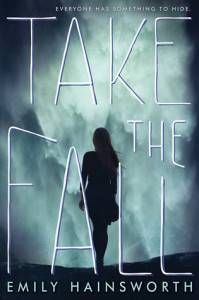 Take the Fall by Emily Hainsworth (February 2016, Balzar + Bray)
Take the Fall by Emily Hainsworth (February 2016, Balzar + Bray)
When Gretchen Meyer is found dead, the entire community of Hidden Falls wants to know who did it. Sonia Feldman, Gretchen’s best friend, was with her that night, and she, too, was a victim of someone’s attempt to hurt her. Everyone thinks they know who is responsible, and Sonia’s on a mission to get to the bottom of the mystery, both because of her own love for Gretchen, as well as for her own safety and the safety of those around her. This is a twisty-turny mystery with a narrator who isn’t exactly the most reliable. We get bits and pieces of the story and the relationships among characters as it goes along, and we’re forced to question what we know as much as what we don’t know. The reveal at the end is nicely done and achieved successfully through the character development. This book has gotten comps to Twin Peaks and those are fair — there are so many neat parallels and winks to the show. This fast-paced, high-tension book about the shades of gray that color all of our lives and the ways we understand the truths of ourselves and others. More please! — Kelly Jensen
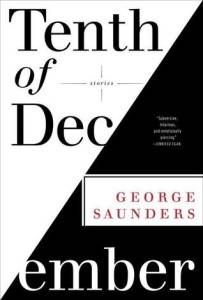 Tenth of December by George Saunders
Tenth of December by George Saunders
At the end of this collection of stories, there’s a nice bonus convo between the author and David Sedaris. The back and forth is fantastic, but one of the things it gets to the heart of is Saunders’ ability to write with abandon. His stories place characters in peculiar, somewhat dystopian positions, and they react to conflict in ways that’s both realistic and discomforting. Each story is exactly as long as it needs to be, which is just enough time for us to catch a glimpse of a pivotal moment, to see a character put on trial, to wonder where we are and where we’re going. I am way late to this party, but damn am I glad I stopped by. — Aram Mrjoian
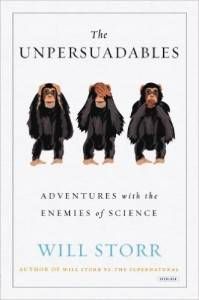 The Unpersuadables: Adventures with the Enemies of Science by Will Storr
The Unpersuadables: Adventures with the Enemies of Science by Will Storr
Not the most festive of books but bloody gripping all the same, this is Storr’s attempts to understand why people believe the things they do, even if the world tells them they’re wrong. Storr meets religious leaders, hardcore sceptics and bunch of quirky characters inbetween and even delves into the neuroscience. (Realising how untrustworthy your own beliefs are is a little unnerving.) It’s the sort of book you’ll feel the need to share fascinating facts from at regular intervals. — Rachel Weber











